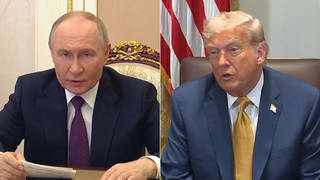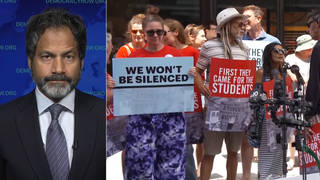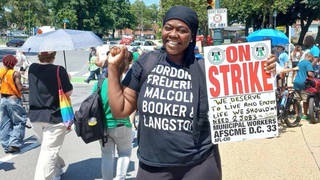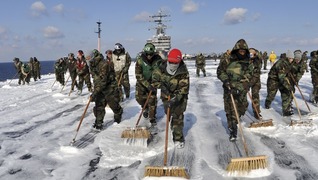
Guests
- Yukiko Kameyaformer resident of Futaba, the town that housed part of the Fukushima Daiichi nuclear power plant.
On our final day of our special broadcast from Tokyo, we speak with a Japanese resident from the town that housed part of the Fukushima Daiichi nuclear power plant who is participating in weekly protests against the resumption of nuclear power in her country. “We couldn’t bring anything from our houses. We didn’t have a toothbrush. We didn’t have a blanket. We didn’t have towels. We had nothing. It was truly hell, and we thought it would be much better to die. But now, we are here, and we can’t really give up. We want to fight for this cause,” Yukiko Kameya said as she attended a demonstration outside Prime Minister Shinzo Abe’s official residence. “We told the prime minister many times, every week here, that we are against the reopening of the nuclear facilities, but it doesn’t seem that he gets it. He just does whatever he wants to do anyway.”
Transcript
AMY GOODMAN: We are on the road in Tokyo, Japan, broadcasting for the third of our three days of specials. Japan is getting ready to mark the third anniversary of one of the world’s worst atomic disasters. It was March 11th, 2011, when a massive 9.0-magnitude earthquake triggered a devastating tsunami that struck Japan’s northeast coast. What began as a natural disaster quickly cascaded into a man-made one, as system after system failed at the Fukushima Daiichi nuclear power plant. Three of the six reactors suffered meltdowns, releasing deadly radiation into the atmosphere and the ocean.
Three years later, Japan is still reeling from the impact of the disaster. More than 340,000 people became nuclear refugees, forced to abandon their homes and their livelihoods. Entire towns were forced to evacuate, including Futaba, a town that housed part of the Fukushima Daiichi plant. Before March 11, 2011, nearly 7,000 people lived in the town. Today Futaba is a nuclear ghost town. The government relocated many of the residents to an abandoned school near Tokyo, where they live in cramped, shared common areas, many families to a room, are provided with three box lunches per day. The refugees were given permits to return home to collect personal items, but only for two hours.
Just before this broadcast, Democracy Now! producer Mike Burke spoke with an evacuee from Futaba. She was one of hundreds of anti-nuclear protesters who were outside the official residence of the Japanese prime minister demonstrating.
YUKIKO KAMEYA: [translated] My name is Yukiko Kameya. I’m from Futaba, which was 2.1 kilometers from Fukushima Daiichi nuclear facility. Right now, we have evacuated, and we are living in a temporary housing in Tokyo in a space provided by the government. It’s close here, so I’m coming here every Friday to demonstrate against the nuclear power facilities. When we fled Futaba, we had nothing. We lost everything. We couldn’t bring anything from our house. We didn’t have a toothbrush. We didn’t have a blanket. We didn’t have towels. We had nothing. It was truly hell, and we thought it would be much better to die. But now we are here, and we can’t really give up. We want to fight for this cause. When I fled from to Futaba, I couldn’t even talk. I couldn’t even have friends over or anything. But my people encouraged me to be standing here right now. Without the people’s help, I couldn’t be here. That’s why I appreciate them, and I want to join them in their call.
MIKE BURKE: And what is your message to the Japanese government and the world about nuclear power?
YUKIKO KAMEYA: [translated] I don’t want anyone in the world to experience what we have experienced. We have houses in Futaba, but there’s nothing there. Everything is robbed. All the furniture was broken. I can’t really go back there. We know it. We don’t want anyone in the world to be in the situation we are in. There are 59 children with thyroid problem, and there are hundreds more on the way. The real problem in Fukushima is children cannot go out and play. They have to stay inside, and this is not the way children should grow up. I don’t want anyone in the world, or Japan, to experience this type of situation for children, so I want to stop nuclear facilities now, and I don’t want them to be continued.
MIKE BURKE: Do you think you’ll ever be able to return to your home?
YUKIKO KAMEYA: [translated] The Futaba where I lived is not livable, and the government says so. So I know we are never going back in my entire life. But for the Fukushima prefecture, it is still not safe. The radiation level is still very high, so I don’t think it’s safe, and I don’t think we’ll go back there.
MIKE BURKE: And what is your assessment of how the government has handled the crisis?
YUKIKO KAMEYA: [translated] We expected our government to do a better job when this accident happened, but they don’t really do what you want. They ignore all the problems we are having. There are many young people between 15 and 19 in Fukushima who are in high school, who have died suddenly. For example, this morning, I saw online a story that a 17-year-old died from leukemia. In the morning, when his mother came to wake him up, he was found dead in bed. Everyone says this was caused by the radiation level from the nuclear accident, but our government never recognized it. And there are many children, 59 children, with thyroid cancer. They will never recognize it as being caused by the radiation.
MIKE BURKE: We’re standing right now outside the prime minister’s official residency. What is your message to the prime minister?
YUKIKO KAMEYA: [translated] We told the prime minister many times, every week here, that we are against the reopening of the nuclear facilities. But it doesn’t seem that he gets it. He just does whatever he wants to do anyway. In Futaba, when we had a meeting with TEPCO, we were told the facility is very, very safe. Now we know it is not safe at all. And we’ve been telling the prime minister it’s not safe, so do not restart, but it doesn’t seem like it’s getting through to him. My real feeling is that I want to go back to Futaba-machi in Fukushima, but I know we can’t go back. And I dream of it every day. And I know we cannot go back, so I don’t want anyone in the world to feel this way. We want to stop it now.
AMY GOODMAN: Those were the words of Yukiko Kameya. She is a former resident of Futaba, which is the town where part of the Fukushima Daiichi nuclear plant is located. She fled her home after the nuclear meltdown and will likely never be able to return home. When we come back from break, we’ll be joined by the former mayor of Futaba. Stay with us.













Media Options